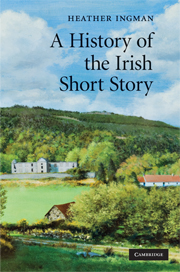Book contents
- Frontmatter
- Contents
- Acknowledgments
- 1 Introduction
- 2 The nineteenth century: nation and short story in the making
- 3 Fin de siècle visions: Irish short fiction at the turn of the century
- 4 The modern Irish short story: Moore and Joyce
- 5 1920–1939: years of transition
- 6 1940–1959: isolation
- 7 1960–1979: time, memory and imagination
- 8 1980 to the present: changing identities
- Notes
- Biographic glossary
- Bibliographic essay
- Index
4 - The modern Irish short story: Moore and Joyce
Reading: James Joyce
Published online by Cambridge University Press: 04 August 2010
- Frontmatter
- Contents
- Acknowledgments
- 1 Introduction
- 2 The nineteenth century: nation and short story in the making
- 3 Fin de siècle visions: Irish short fiction at the turn of the century
- 4 The modern Irish short story: Moore and Joyce
- 5 1920–1939: years of transition
- 6 1940–1959: isolation
- 7 1960–1979: time, memory and imagination
- 8 1980 to the present: changing identities
- Notes
- Biographic glossary
- Bibliographic essay
- Index
Summary
The Irish Literary Revival returned cultural energy and optimism to Ireland and, though the Revival is mainly associated with drama and poetry, this period was also responsible for beginning the transformation of Irish short fiction into the modern Irish short story. However, as we started to see at the end of the last chapter, it can be argued that the modern Irish short story was being shaped, not, as the Irish Revivalists proclaimed, by the indigenous folk tradition, but by foreign influences, including the Russian writers, Turgenev and Chekhov, the French writers, Flaubert and Maupassant, and, prefiguring James Joyce, Scandinavian writers like Ibsen. The turn of the century debates on the aesthetics of the short story were no doubt a factor in attracting Joyce, a writer unusually alert to international developments, to the form. Joyce believed that Yeats was on the wrong track with his obsession with folk themes, but he did appreciate his stories of the occult addressed to an educated elite: Stephen Hero is so impressed by Yeats' portrayal of wandering magi that he learns by heart ‘The Adoration of the Magi’ and ‘The Tables of the Law’, and traces of the card-playing Red Hanrahan have been detected in ‘After the Races’. There is a connection, too, with George Moore, who claimed, with uncertain veracity, to have helped Yeats solve a problem with one of his stories in The Secret Rose.
- Type
- Chapter
- Information
- A History of the Irish Short Story , pp. 84 - 112Publisher: Cambridge University PressPrint publication year: 2009



